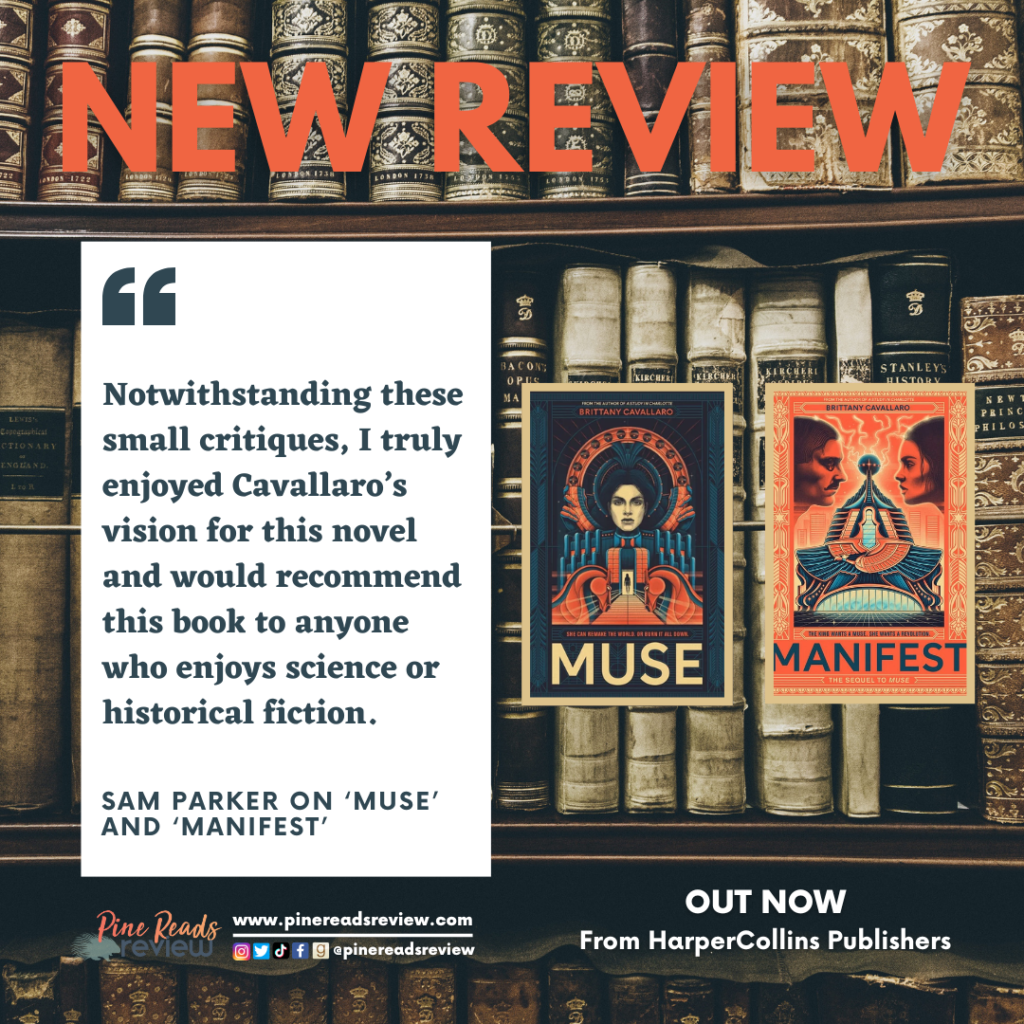
Out now from HarperCollins Publishers; 368 pages (Muse) and 384 pages (Manifest)
Content Warning: Death, violence, torture, sexual content
About the Author: “Brittany Cavallaro is the New York Times bestselling author of the Charlotte Holmes novels, including A Study in Charlotte and, most recently, A Question of Holmes (HarperCollins/Katherine Tegen Books). With Emily Henry, she is the author of Hello Girls (HarperCollins/Katherine Tegen Books). Muse, the first novel in a historical fantasy duology, releases in February 2021. Cavallaro is also the author of the poetry collections Girl-King and Unhistorical, both from University of Akron Press. A recipient of a National Endowment in the Arts fellowship, she received her MFA in creative writing from the University of Wisconsin-Madison and her PhD in English literature from the University of Wisconsin-Milwaukee. Currently, she teaches creative writing at the Interlochen Arts Academy in Michigan” (Bio found on author’s website).
Find Brittany Cavallaro on the following platforms:
In an alternate universe where the US adopted a monarchy instead of a democracy after the Revolutionary War, protagonist Claire Emerson deals with a series of personal trials as the country sits on the brink of war. Throughout the Muse series, Claire, along with an unlikely crew of inventors, politicians, soldiers, orphans and revolutionaries, work to dismantle the oppressive system that rules American lives. Familiar historical names (like the Washington family and Nikola Tesla) meet, fight, and join forces with new characters (like Claire and Governor Remy DuChamp). All the while, Claire is battling with her own personal conflicts; she seems to have a special “gift” for granting the wishes of the men around her, a service that has been exploited by her abusive father and a host of malicious men in power. As she embarks on a variety of adventures, Claire must grapple with this supposed endowment and find a power within herself to grant her own wishes.
I found myself very intrigued by the alternate history that forms the backdrop for this narrative; the combination of the familiar (an American love for baseball, the Industrial Revolution, the women’s rights movement, etc.) with the distinctly unfamiliar (an American monarchy) told a new tale of the United States. I appreciated the way Cavallaro integrated political commentary throughout her work, with references to topics like the immigration and xenophobia, institutional misogyny, and the intersectionality of activist movements that, despite being cast in this 1893 setting, are still relevant to audiences today. With that being said, I wish there were other plotlines that had been explored in further depth. Because there was so much going on in the series, seemingly important aspects of the narrative didn’t receive as much attention as I felt they merited, like Claire’s supposed “powers,” which at times were integral to the plot and at other times were pushed to the backburner, or the romantic relationships. As someone who loves a romance subplot, I was disappointed to find myself not altogether invested in some of the ones throughout this duology despite my high regard for the compelling characters Cavallaro crafted. Notwithstanding these small critiques, I truly enjoyed Cavallaro’s vision for this novel and would recommend this book to anyone who enjoys science or historical fiction.
Sam Parker, Pine Reads Review Writer